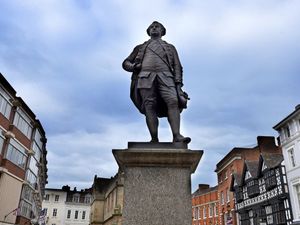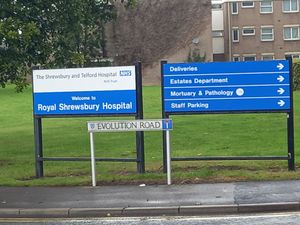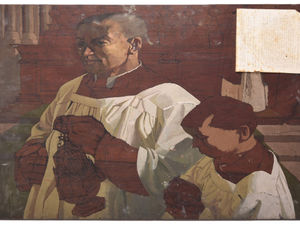Clive of India statue to remain in Shrewsbury after council vote
The Clive of India statue will remain in Shrewsbury town centre after councillors voted to take no action.

Shropshire Council debated the statue at a virtual full council meeting following a number of petitions signed by tens of thousands to take down the monument in The Square.
Protesters wanted the statue removed due to Robert Clive's history in which he gained vast wealth from establishing British power in India in his role with the East India Company.
Council leader Peter Nutting said he opposed removing the statue and that he had "masses of support for that stance."
Councillor Julian Dean said to leave the statue up would be ignoring the wrongs Clive did in his life, while Councillor Pauline Dee said that while she welcomed Black Lives Matter demonstrations, attention would be better spent getting ready for when the full force of the economic downturn from the coronavirus pandemic hits.
See the petitions launched for and against the removal of the statue here:
In the vote, 28 councillors chose to take no action on the future of the statue, 17 voted against and one abstained.
David Parton, creator of the largest petition opposed to the statue, said: “We are disappointed by Shropshire Council’s tone-deaf decision to retain the statue of the mass-murderer Robert Clive in The Square, Shrewsbury.
“It is vital we learn from our past, but we should not have to live in it. Despite more than 20,000 people calling for this statue to be moved to a museum, council members chose to ignore the concerns of minority communities and revel in Clive’s murderous legacy.
“This vote was just the start of the movement to remove Clive’s statue. Like with Colston and Rhodes, Clive will fall. Today’s decision has simply delayed the inevitable.”
In brief: Who was Robert Clive?
Clive was born on the Styche Hall estate, near Market Drayton, in 1725 and went to school in London before travelling to India with the East India Company in 1743.
After two years in Britain, in 1755 Clive returned to India and two years later retook Calcutta (now Kolkata) for the company at the Battle of Plassey, a key moment on Britain's path to controlling Bengal and then India for almost two centuries.
Corruption and looting saw Clive amass a huge amount of wealth and he returned to Britain in 1760, aged 34.
He was made Baron Clive of Passey, knighted and became Shrewsbury's MP, a position he held until his death.
He went back to India in 1765 for two years before returning to Britain where the activities of Clive and the East India Company in India came under sustained attack.
The famine of Bengal that lasted between 1769 and 1773 and killed around a third of the region's population was said to have largely been caused by the company's policies.
Clive defended himself in Parliament, saying "I stand astonished at my own moderation," and in 1773 Parliament declared that he did “render great and meritorious services to his country.”
He died at home in London aged 49 and is believed to have killed himself.
All the petitions can be found by searching ‘Clive of India’ on change.org.





